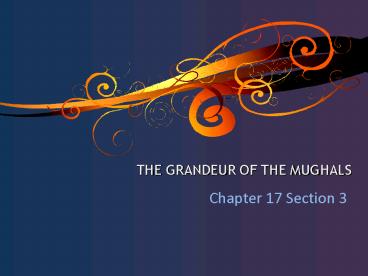Chapter 17 Section 3 PowerPoint PPT Presentation
1 / 19
Title: Chapter 17 Section 3
1
THE GRANDEUR OF THE MUGHALS
- Chapter 17 Section 3
2
The Mughal Dynasty A Gunpowder Empire?
- 1500 1800
- High point of traditional culture in India
- Founders of the Mughals (or Moguls)
- not natives of India from north Indus River
Valley - Founder Babur
- Seized Kabul and then headed to India
3
Contd
- Advantages
- Advanced weapons artillery and fast cavalry
tactics - Captured Delhi with 12,000 soldiers
- Established his power in North India
- Grandson, Akbar, expanded the empire
- From Himalayan Mnts. to the Godavari River from
Kashmir to Brahmputra and Ganges Rivers
4
(No Transcript)
5
(No Transcript)
6
Akbar and Indo-Muslim Civilization
- Akbar Greatest conquering Mughal monarchs
- Also known for the humane character of his rule
- Tolerant of Indian diversity and religion
- Allowed Hindus to serve in court
- Married a Hindu princess
- Tolerant in government
- Upper ranks filled with nonnative Muslims
- Lower positions were Hindus
7
Contd
- Practiced payment of local officials with land
instead of salaries - Local officials zamindars kept a portion of
the taxes paid by the peasants in lieu of a
salary - Akbar era a good one
- When bad weather struck, the taxes were reduced
and sometimes suspended - Because of peace, trade flourished
8
Contd
- Trade
- Textiles, tropical food products and spices,
precious stones exported for gold and silver
9
Twilight of the Mughals
- Adbar died in 1605
- Son succeeded Jahangir
- Strengthened India in the early years control
weakened eventually - The court under this wife Nur Jahan
- Took advantage by helping her own family
especially her son, Shah Jahan - He ordered the assassination of his rivals
- Shah Jahan expanded the empire
- Domestic problems no money!!! His mom spent it
all - Raised taxes
10
(No Transcript)
11
Contd
- Did little to improve the rural conditions
- Drought was frequent
- Transport primitive
- 3 months to travel 600 miles
- Shah Jahan got sick
- Sons argued who would be successor
- Aurangzeb killed his brother and imprisoned his
father and made himself emperor
12
Aurangzeb
- Most controversial ruler in India
- Tried to eliminate Indias social evils
- Forbade the Hindu custom of suttee and the
levying of illegal taxes - Tried to forbid gambling and drinking
- Very Muslim anti-Hindu
- Led to a lot of revolts
- Other outside forces helped bring the empire down
- Delhi was sacked by the Persians Europeans
started coming in
13
(No Transcript)
14
Impact of Western Power in India
- First Europeans Portuguese
- Dominated regional trade in Indian Ocean
- British and Dutch took over
- British presence in India steadily increased
- Trading forts at Surat, Fort William, Bay of
Bengal and Madras - Cotton was the export
15
Contd
- British attracted rivals Dutch French
- French were more persistent
- British guy Sir Robert Clive, military genius
- Pushed the French back as well as Mughal armies
- Battle of Plassey British had 3,000 Mughal
army had 30,000 British won - British creeping further and further into the
interior of India for economic purposes for the
British East India Company - Ruled with arrogance, corruption and incompetence
16
Contd
- Smart Indian commanders used guerrilla tactics of
ambush when rebelling - Said Haidar Ali pg 536
- Not all Indian commanders were that good
- East India Company under Lord Cornwallis and then
Lord Mornington - Able to consolidate British power in India
17
(No Transcript)
18
Contd
- Immediate impact on India was on the coast
- Fort William turned into a major city (later
Calcutta) as well as Bombay - British kept coming more inland to squeeze the
local population to trading privileges - Good for British wealth terrible for Indian
economy - No money for the Indians
19
Contd
- Destroyed the once healthy local industries
- Hurt the peasants
- Applied British law
- Couldnt pay taxes? Were gonna take your land
- Poverty shot through the roof.
- Massive famines in the 1770s killed 1/3 of the
population

